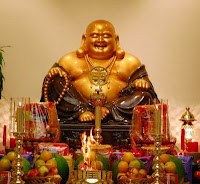A middle-aged couple, the Lamberts were on a cruise ship headed for Asia in 1928. Their first stop was Japan. Mrs. Lambert fell in love with an old statuette in one Kobe junk shop window. The couple was pleasantly surprised to discover it was priced reasonably.
 |
| Kobe Japan 1920s |
The shopkeeper told them that it was a Laughing Buddha or Ho-tei. It was the Japanese god for good luck, especially for travelers. But by the end of their voyage the Lamberts would discover this would not be true for them.
The shopkeeper told them that Ho-tei had been a Buddhist monk in the 6th century who spent his life helping the poor and caring for children. He later was made a god.
 |
| Two ivory Laughing Buddhas. |
The Lamberts admired the finely carved statue. It was old, made of creamy ivory and was of a half-naked fat man sitting on a cushion. They discovered a small ivory plugged hole at the bottom.
The statue had the figure of a child clinging to its back. The shop owner told them that many Laughing Buddhas had “children” on their backs.
The statue had the figure of a child clinging to its back. The shop owner told them that many Laughing Buddhas had “children” on their backs.
This was because of a legend that stated Ho-tei had once carried a child to safety across a flooded river.
The couple happily bought the statue and went on their way. Back on the ship Marie Lambert wrapped the statue carefully and placed it in one of her suitcases.
Soon after the couple began to be plagued by fevers and toothaches. At two separate ports in Australia, Marie and then her husband C. J. sought out dentists to ease their pain—but once ashore their pain was mysteriously gone.
Once back onboard their toothaches resumed. Marie pulled out the statue one evening to show a fellow traveller who admired the fine workmanship.
He had lived in Japan, and he told them that St. Christopher, which is used by westerners as a good luck charm and for travel protection, might have originated from Ho-tei.
On their way back to their home in London the Lambert’s stopped in the states to visit Marie’s mother. This woman also admired the ivory statuette. Marie then gave it to her as a gift.
But within hours her mother suffered a toothache and she gave the statue back to the couple stating it had not brought her good luck.
This is when the couple made the connection between their toothaches and the old statue. Each time the statue had been in their cabin onboard ship they had become ill but when the suitcase it was in had been removed to the ship’s storage they had recovered.
While they had been ashore in Australia—they had been away from this suitcase so their toothaches had disappeared.
On board another ship headed for London, Marie wanted to throw the statue overboard but C. J. stopped her stating that they best not for all their teeth might rot.
Home in London, the couple took the statue to an Asian antique dealer. Admiring the statue he offered to pay them more than what they had paid but they refused stating they just wanted to get rid of the statue—but were afraid to destroy it.
After hearing the Lambert’s stories of painful toothaches and fevers this man called in an old Japanese friend.
The two examined the statue and discovered the plugged hole on the base. Several days later this dealer requested the Lambert’s stop by his store at their convenience.
As they entered his store they noticed the Ho-tei had a place of honor on one counter. In fact, it looked like a shrine. There were lit joss sticks in front of it.
 |
| Laughing Buddha Shrine |
He told the couple what his friend had told him. This Ho-tei was probably used as a temple god. The two men had discovered a small medallion inside the statue.
These medallions where placed in Laughing Buddha statues in order to give them a “soul.” This meant this statue just needed to be treated with reverence.
He pointed out the shrine. He then bowed down. He told the skeptical couple with proper care this statue would no longer be a threat.
He pointed out the shrine. He then bowed down. He told the skeptical couple with proper care this statue would no longer be a threat.

